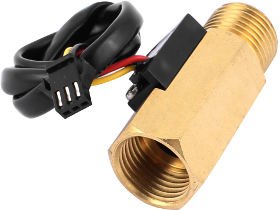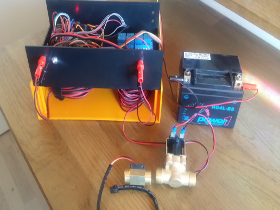Deze pagina is verouderd. Ga naar de vernieuwde pagina. Hall sensors
- Werking
|  Zoals de naam al zegt: Hall Effect Water Flow Sensor. Het Hall effect (wiki) is niets anders dan dat er 2 magneten elkaar passeren en daardoor een elektrische puls afgeven. Er zit een propeller in de sensor die bij iedere rotatie een elektrisch puls afgeeft. De waterstroom meter bevat een radertje dat gaat draaien als het water stroomt. Iedere draai komt een magneetje voorbij het vaste spoeltje. De elektrische stroom die ontstaat als het magneetje voorbij het spoeltje komt start een interrupt in onze microcontroller. En vanaf dat moment is het een software verhaal. Belangrijk is dus dat de gele draad wordt verbonden met een pin die een interrupt kan verwerken.
Zoals de naam al zegt: Hall Effect Water Flow Sensor. Het Hall effect (wiki) is niets anders dan dat er 2 magneten elkaar passeren en daardoor een elektrische puls afgeven. Er zit een propeller in de sensor die bij iedere rotatie een elektrisch puls afgeeft. De waterstroom meter bevat een radertje dat gaat draaien als het water stroomt. Iedere draai komt een magneetje voorbij het vaste spoeltje. De elektrische stroom die ontstaat als het magneetje voorbij het spoeltje komt start een interrupt in onze microcontroller. En vanaf dat moment is het een software verhaal. Belangrijk is dus dat de gele draad wordt verbonden met een pin die een interrupt kan verwerken.
Next we are going to use a 10K Ohm resistor (Brown, Black, Orange) as a pull up resistor. The pull up resistor prevents a situation where the Arduino digital input pin ends up floating (think of this as the input not definitively being on or off). When an input is floating it may hold the last value, it may flip between off and on, quite random – generally not a good thing when we are trying to tell if it is on or off!
You can just define pin 2 as INPUT_PULLUP and then you don`t need the 10k pullup resistor. Make sure you define the pin before attaching the interrupt.
The Hall effect sensor works on the principle of the Hall effect, which states that whenever a magnetic field is applied in a direction perpendicular to the flow of electric current in a conductor, a potential difference is induced. This voltage can be used to detect whether the sensor is in the proximity of a magnet or not. The Arduino can detect this voltage change through its interrupt pin and determine whether the magnet is near the sensor or not.
The US1881 is a latching Hall effect sensor. The sensor gives out an output HIGH (5V) voltage whenever the north pole of a magnet is brought close to it. Even when the magnet is removed, the sensor still outputs a HIGH voltage and does not go LOW (0V) until the south pole of the magnet is brought close to it. These sensors that latch on to a particular state are called latched Hall effect sensors.
The US5881 is a non-latching Hall effect sensor. The sensor gives an output HIGH voltage whenever the north pole of a magnet is brought close to it, and switches LOW whenever the magnet is removed. I personally prefer non-latching Hall effect sensors like the US5881 for my projects.
instructables = waterflow-03.ino
2560 interrupt pins.
interrupts pagina.
https://www.youtube.com/watch?v=NLIilod1J9E
https://forum.arduino.cc/index.php?topic=8548.0
https://www.electroschematics.com/working-with-water-flow-sensors-arduino/
|
- Originele documentatie van Banggood
|
 G1/2 Copper Hall Effect Liquid Water Flow Sensor Flow Meter (link)
G1/2 Copper Hall Effect Liquid Water Flow Sensor Flow Meter (link)
Specifications
Material: Copper
Color: Gold
Type: G1/2"(External Thread Diameter), DN20mm
Water Quality Requirement: ≤60℃
Start Flow Range: 1.5L/min
Flow Range: 1-30L/min
Maximum waterdruk: 1.75MPa (= 17,5 bar)
Working Voltage Range: DC4.5-18V
Max Current: 10mA
Insulation resistance:>100MΩ
Electrical Strength: AC500V, 50Hz
Copper Switch Length: Approx. 44mm / 1.8inch
Wire Length: Approx. 35cm / 13.8inch
Weight: Approx. 95g
Features:
1. Made of high-quality copper material, environmental-friendly, really sturdy and durable to use.
2. its maximum water pressure is 1.75MPa, the range of flow is from 1L/min to 30L/min.
3. Three wire connection: Red for positive pole, black for negative pole, yellow for pulse signal.
4. There is an integrated hall effect sensor that outputs an electrical pulse with every revolution. The hall effect sensor is sealed from the water pipe and allows the sensor to stay safe and dry.
5. Lightweight, reasonable size, stable performance, low water pressure start, easy to install, safe to use.
6. Can be perfectly used for water heaters, water dispenser, water purifier, water vending machine, coffee maker, flow measurement device, water control machine and so on. |
| Algemene informatie over dit onderdeelAlgemene informatie test |
|---|
| Prijs indicatie | € 6,16 | | Menu groep | Sensors | | Laatste verandering | 2022-07-13 |
Warning: include(/var/www/html/robotigs/includes/wishlistperpart.php): Failed to open stream: No such file or directory in /var/www/html/robotigs/includes/parts_header.php on line 128
Warning: include(): Failed opening '/var/www/html/robotigs/includes/wishlistperpart.php' for inclusion (include_path='.:/usr/share/php') in /var/www/html/robotigs/includes/parts_header.php on line 128
|
|